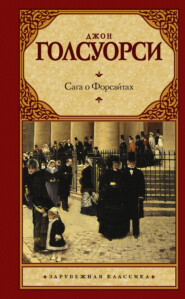По всем вопросам обращайтесь на: info@litportal.ru
(©) 2003-2025.
✖
Loyalties
Настройки чтения
Размер шрифта
Высота строк
Поля
Loyalties
John Galsworthy
John Galsworthy
Loyalties
ACT I
SCENE I
The dressing-room of CHARLES WINSOR, owner of Meldon Court, near Newmarket; about eleven-thirty at night. The room has pale grey walls, unadorned; the curtains are drawn over a window Back Left Centre. A bed lies along the wall, Left. An open door, Right Back, leads into LADY ADELA's bedroom; a door, Right Forward, into a long corridor, on to which abut rooms in a row, the whole length of the house's left wing. WINSOR's dressing-table, with a light over it, is Stage Right of the curtained window. Pyjamas are laid out on the bed, which is turned back. Slippers are handy, and all the usual gear of a well-appointed bed-dressing-room. CHARLES WINSOR, a tall, fair, good-looking man about thirty-eight, is taking off a smoking jacket.
WINSOR. Hallo! Adela!
V. OF LADY A. [From her bedroom] Hallo!
WINSOR. In bed?
V. OF LADY A. No.
She appears in the doorway in under-garment and a wrapper. She, too, is fair, about thirty-five, rather delicious, and suggestive of porcelain.
WINSOR. Win at Bridge?
LADY A. No fear.
WINSOR. Who did?
LADY A. Lord St Erth and Ferdy De Levis.
WINSOR. That young man has too much luck – the young bounder won two races to-day; and he's as rich as Croesus.
LADY A. Oh! Charlie, he did look so exactly as if he'd sold me a carpet when I was paying him.
WINSOR. [Changing into slippers] His father did sell carpets, wholesale, in the City.
LADY A. Really? And you say I haven't intuition! [With a finger on her lips] Morison's in there.
WINSOR. [Motioning towards the door, which she shuts] Ronny Dancy took a tenner off him, anyway, before dinner.
LADY A. No! How?
WINSOR. Standing jump on to a bookcase four feet high. De Levis had to pay up, and sneered at him for making money by parlour tricks. That young Jew gets himself disliked.
LADY A. Aren't you rather prejudiced?
WINSOR. Not a bit. I like Jews. That's not against him – rather the contrary these days. But he pushes himself. The General tells me he's deathly keen to get into the Jockey Club. [Taking off his tie] It's amusing to see him trying to get round old St Erth.
LADY A. If Lord St Erth and General Canynge backed him he'd get in if he did sell carpets!
WINSOR. He's got some pretty good horses. [Taking off his waistcoat] Ronny Dancy's on his bones again, I'm afraid. He had a bad day. When a chap takes to doing parlour stunts for a bet – it's a sure sign. What made him chuck the Army?
LADY A. He says it's too dull, now there's no fighting.
WINSOR. Well, he can't exist on backing losers.
LADY A. Isn't it just like him to get married now? He really is the most reckless person.
WINSOR. Yes. He's a queer chap. I've always liked him, but I've never quite made him out. What do you think of his wife?
LADY A. Nice child; awfully gone on him.
WINSOR. Is he?
LADY A. Quite indecently – both of them. [Nodding towards the wall, Left] They're next door.
WINSOR. Who's beyond them?
LADY A. De Levis; and Margaret Orme at the end. Charlie, do you realise that the bathroom out there has to wash those four?
WINSOR. I know.
LADY A. Your grandfather was crazy when he built this wing; six rooms in a row with balconies like an hotel, and only one bath – if we hadn't put ours in.
WINSOR. [Looking at his watch] Half-past eleven. [Yawns] Newmarket always makes me sleepy. You're keeping Morison up.
LADY ADELA goes to the door, blowing a kiss. CHARLES goes up to his dressing-table and begins to brush his hair, sprinkling on essence. There is a knock on the corridor door.
Come in.
DE LEVIS enters, clad in pyjamas and flowered dressing-gown. He is a dark, good-looking, rather Eastern young man. His face is long and disturbed.
Hallo! De Levis! Anything I can do for you?
DE LEVIS. [In a voice whose faint exoticism is broken by a vexed excitement] I say, I'm awfully sorry, Winsor, but I thought I'd better tell you at once. I've just had – er – rather a lot of money stolen.
WINSOR. What! [There is something of outrage in his tone and glance, as who should say: "In my house?"] How do you mean stolen?
DE LEVIS. I put it under my pillow and went to have a bath; when I came back it was gone.
WINSOR. Good Lord! How much?
DE LEVIS. Nearly a thousand-nine hundred and seventy, I think.
WINSOR. Phew! [Again the faint tone of outrage, that a man should have so much money about him].
DE LEVIS. I sold my Rosemary filly to-day on the course to Bentman the bookie, and he paid me in notes.
WINSOR. What? That weed Dancy gave you in the Spring?
John Galsworthy
John Galsworthy
Loyalties
ACT I
SCENE I
The dressing-room of CHARLES WINSOR, owner of Meldon Court, near Newmarket; about eleven-thirty at night. The room has pale grey walls, unadorned; the curtains are drawn over a window Back Left Centre. A bed lies along the wall, Left. An open door, Right Back, leads into LADY ADELA's bedroom; a door, Right Forward, into a long corridor, on to which abut rooms in a row, the whole length of the house's left wing. WINSOR's dressing-table, with a light over it, is Stage Right of the curtained window. Pyjamas are laid out on the bed, which is turned back. Slippers are handy, and all the usual gear of a well-appointed bed-dressing-room. CHARLES WINSOR, a tall, fair, good-looking man about thirty-eight, is taking off a smoking jacket.
WINSOR. Hallo! Adela!
V. OF LADY A. [From her bedroom] Hallo!
WINSOR. In bed?
V. OF LADY A. No.
She appears in the doorway in under-garment and a wrapper. She, too, is fair, about thirty-five, rather delicious, and suggestive of porcelain.
WINSOR. Win at Bridge?
LADY A. No fear.
WINSOR. Who did?
LADY A. Lord St Erth and Ferdy De Levis.
WINSOR. That young man has too much luck – the young bounder won two races to-day; and he's as rich as Croesus.
LADY A. Oh! Charlie, he did look so exactly as if he'd sold me a carpet when I was paying him.
WINSOR. [Changing into slippers] His father did sell carpets, wholesale, in the City.
LADY A. Really? And you say I haven't intuition! [With a finger on her lips] Morison's in there.
WINSOR. [Motioning towards the door, which she shuts] Ronny Dancy took a tenner off him, anyway, before dinner.
LADY A. No! How?
WINSOR. Standing jump on to a bookcase four feet high. De Levis had to pay up, and sneered at him for making money by parlour tricks. That young Jew gets himself disliked.
LADY A. Aren't you rather prejudiced?
WINSOR. Not a bit. I like Jews. That's not against him – rather the contrary these days. But he pushes himself. The General tells me he's deathly keen to get into the Jockey Club. [Taking off his tie] It's amusing to see him trying to get round old St Erth.
LADY A. If Lord St Erth and General Canynge backed him he'd get in if he did sell carpets!
WINSOR. He's got some pretty good horses. [Taking off his waistcoat] Ronny Dancy's on his bones again, I'm afraid. He had a bad day. When a chap takes to doing parlour stunts for a bet – it's a sure sign. What made him chuck the Army?
LADY A. He says it's too dull, now there's no fighting.
WINSOR. Well, he can't exist on backing losers.
LADY A. Isn't it just like him to get married now? He really is the most reckless person.
WINSOR. Yes. He's a queer chap. I've always liked him, but I've never quite made him out. What do you think of his wife?
LADY A. Nice child; awfully gone on him.
WINSOR. Is he?
LADY A. Quite indecently – both of them. [Nodding towards the wall, Left] They're next door.
WINSOR. Who's beyond them?
LADY A. De Levis; and Margaret Orme at the end. Charlie, do you realise that the bathroom out there has to wash those four?
WINSOR. I know.
LADY A. Your grandfather was crazy when he built this wing; six rooms in a row with balconies like an hotel, and only one bath – if we hadn't put ours in.
WINSOR. [Looking at his watch] Half-past eleven. [Yawns] Newmarket always makes me sleepy. You're keeping Morison up.
LADY ADELA goes to the door, blowing a kiss. CHARLES goes up to his dressing-table and begins to brush his hair, sprinkling on essence. There is a knock on the corridor door.
Come in.
DE LEVIS enters, clad in pyjamas and flowered dressing-gown. He is a dark, good-looking, rather Eastern young man. His face is long and disturbed.
Hallo! De Levis! Anything I can do for you?
DE LEVIS. [In a voice whose faint exoticism is broken by a vexed excitement] I say, I'm awfully sorry, Winsor, but I thought I'd better tell you at once. I've just had – er – rather a lot of money stolen.
WINSOR. What! [There is something of outrage in his tone and glance, as who should say: "In my house?"] How do you mean stolen?
DE LEVIS. I put it under my pillow and went to have a bath; when I came back it was gone.
WINSOR. Good Lord! How much?
DE LEVIS. Nearly a thousand-nine hundred and seventy, I think.
WINSOR. Phew! [Again the faint tone of outrage, that a man should have so much money about him].
DE LEVIS. I sold my Rosemary filly to-day on the course to Bentman the bookie, and he paid me in notes.
WINSOR. What? That weed Dancy gave you in the Spring?

















